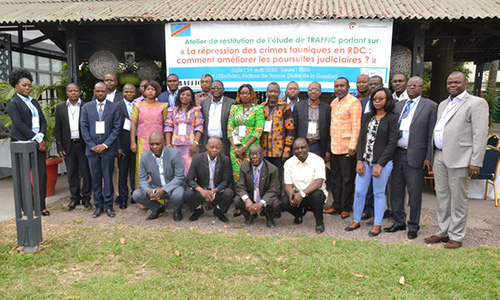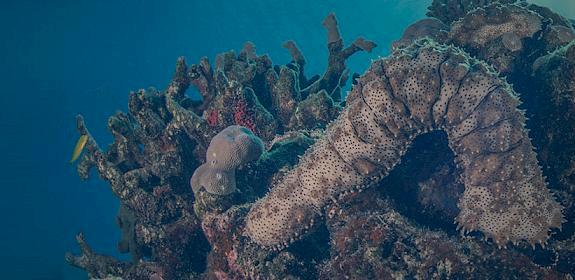Capacity building of key actors involved in wildlife law enforcement in the DRC
Kinshasa, the Democratic Republic of Congo, 14th August 2018—a national workshop was held in the Democratic Republic of Congo (DRC) to present the study on: “Criminal prosecution of wildlife crimes in the DRC: how to improve the legal proceedings?”.
TRAFFIC, with the technical support of JURISTRALE[1], organised a final wrap-up workshop of the joint study entitled: "Criminal prosecution of wildlife crimes in the DRC: how to improve the legal proceedings?".

The main objective of the workshop, which took place at the Gombe Hall of the Maison de la France, was to bring the judicial problems related to wildlife crime to the attention of magistrates, and present potential solutions for the implementation and follow-up on the findings of the study.
Over 40 participants, including representatives of the judiciary, the CITES Management Authority of the DRC, the police, TRAFFIC, the African Wildlife Foundation (AWF), JURISTRALE, and other civil society organisations participated at the workshop.
They discussed ways to improve the ways judiciary handles court cases related to illegal wildlife trade and enhance co-operation at the national level with other law enforcement agencies—with the ultimate aim to review and consolidate the study’s findings.
After fruitful group workshop and an active overall discussion, participants agreed on the below key recommendations to help improve the prosecution of wildlife crime:
- Build the capacity of the officiers de police judiciaire (government-mandated judicial / criminal law enforcement officers, e.g. Customs, police, etc.) and the eco-guards of the Institut Congolais pour la Conservation de la Nature (ICCN[2]);
- Inform the magistrates on laws relating to wildlife crimes;
- Use the latitude of criminal inquiry procedures as much as possible;
- Ensure that cases are brought before the courts;
- Fill the communication deficit between different structures involved in the law enforcement chain, in particular by relying on AFRICA-TWIX (Central Africa’s official Trade in Wildlife Information eXchange system[3]) ;
- Have court decisions implemented and sentences applied.
TRAFFIC is grateful to the financial supported provided by the CITES Management Authority of the Kingdom of Belgium for this workshop.

Notes:
[1] JURISTRALE (Juristes pour le Renforcement et l’Application de la Loi dans le secteur de l’Environnement) is a national non-government organisation (NGO) in the DRC.
[2] ICCN is the authority charged with the overall responsibility and oversight of national parks in the DRC. ICCN works with various national and international NGO partners.
[3] TWIX stands for Trade in Wildlife Information eXchange system. AFRICA-TWIX is Central Africa’s official TWIX system, as mandated by the Central African Forest Commission (COMIFAC).
View the workshop report in French here.
View the final project report in full (in French) here.




